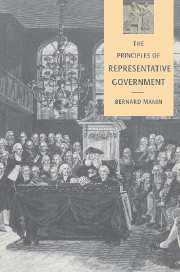Book contents
2 - The triumph of election
Published online by Cambridge University Press: 08 March 2010
Summary
Contrary to what is often thought today, the political use of lot was not peculiar to the Athenian democracy. Prior to the invention of representative government, most political systems where power was exercised by citizens, rather than by an hereditary monarch, had used lot in varying degrees and in a variety of forms. Lot played a part (albeit a limited one) in the assemblies (comitia) of the Roman people. The Italian republics of the Middle Ages and the Renaissance often chose their magistrates by lot. In Florence, the intellectual center of civic humanism and republican renewal, the selection of magistrates by lot was a key institution of the republican system. Finally, Venice – the Most Serene Republic whose stability and longevity fascinated observers – continued to practice a form of lot until its fall in 1797) The new representative governments might call themselves republics (as the United States did from the beginning of the revolution, or as France did from 1792); they were nevertheless breaking with the republican tradition in finding no place for lot.
Yet that republican tradition was still alive in the political culture of the seventeenth and eighteenth centuries. At the very least, it was a subject of debate. The Venetian republic had not yet collapsed. So, at the time when representative government was invented, it was not unknown that lot had been practiced in more places than just Athens and was in fact still in use. Political theorists reflected on the republican experiments past and present.
- Type
- Chapter
- Information
- The Principles of Representative Government , pp. 42 - 93Publisher: Cambridge University PressPrint publication year: 1997

